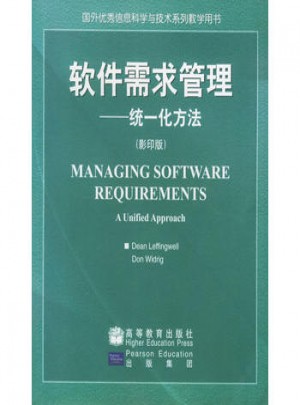

本書論述當今軟件需求管理變化過程中的挑戰,并描述軟件項目成功定義且為所有利益關聯者所認可的過程。本書內容包括:問題分析的五個步驟;商業建模和系統工程;應用和精煉實際案例;軟件系統原型化方法;組織和管理需求信息;建立軟件項目范圍和管理客戶;精煉系統定義;產品需求質量的確定與改進;從軟件需求到系統實現的過程和步驟;驗證軟件系統;軟件變化管理。
作者通過的案例研究,向設計者和開發者說明在整個軟件項目生存周期中管理軟件需求的六個至關重要的技巧:分析問題,理解用戶需要,定義系統,管理項目范圍,精煉系統定義和構建正確系統。
內容:1. 軟件需求問題 2. 軟件需求管理簡介 3. 軟件開發小組 及時部分 問題分析:4. 問題分析的五個步驟 5. 商業建模 6. 軟件增強系統的系統工程 第二部分 理解用戶需要:7. 需求啟發的挑戰 8. 產品或系統的特征 9. 面試 10. 需求探討 11. 集思廣益與思想精簡 12. 想法精要 13. 運用實際案例 14. 行為演練 15. 模型化示范 第三部分 系統定義:16. 組織需求信息 17. 可視文檔 18. 方案優化 第四部分 項目范圍管理:19. 項目范圍問題 20. 建立項目范圍 21. 客戶管理 22. 范圍管理與軟件開發過程模型 第五部分 精煉系統定義: 23. 軟件需求 24. 精煉實際案例 25. 現代軟件需求規則 26. 多義性與專一性 27. 軟件需求的質量度量 28. 確定需求的技術性方法 第六部分:構造正確系統 29. 構造正確系統概述 30. 從需求到實現 31. 運用可溯性支持驗證 32. 驗證系統 33. 運用投資收益率決定驗證工作 34. 變更事件管理 35. 實際操作練習
作者Dean Leffingwell是Rational Software公司副總裁、Rational大學常務理事,負責方法學研究和客戶培訓。Don Widrig是技術型作家和顧問。
Foreword
Preface
Introduction
Chapter1 The Requirements Problem
Chapter2 Introducion to Requirements Management
Chapter3 The Software Team
Team Skill1 Analyzing the Problem
Chapter4 The Five Steps in Problem
Chapter5 Business Modeling
Chapter6 Systems Engineering of Software-Intensive Systems
Team Skill2 Understanding User Needs
Chapter7 The Challenge of Riquirements Elicitation
Chapter8 The Features of a Product or System
Chapter9 Interviewing
Chapter10 Requirements Wordshops
Chapter11 Brainstorming and Ldea Reduction
Chapter12 Storyboarding
Chapter13 Applying Use Cases
Chapter14 Role Playing
Chapter15 Prototyping
Team Skill13 Defining the System
Chapter16 Organizing Requirements Information
Chapter17 The Vision Document
Chapter18 The Champion
Team Skill4 Managing Scope
Chapter19 The Problem of Project Scope
Chapter20 Establishing Project-Scope
Chapter21 Establishing Project Scope
Chapter22 Managing Your Customer
Chapter23 Scope Mangagement and Software Developement Process Models
Team Skill5 Refining the System Definition
Chapter24 Sotware Requirements
Chapter25 Refining the Use Cases
Chapter26 A Modern Software Requirements Specification
Chapter27 Quality Measures of Software Requirements
Chapter28 Technical Methods for Specifying Requirements
Team Skill6 Building the Right System
Chapter29 Buliding the Right System Right:Overview
Chapter30 Form Requirements to Implementation
……
Appendix A
Appendix B
Appendix C
Appendix D
Appendix E
Bibiography
Index